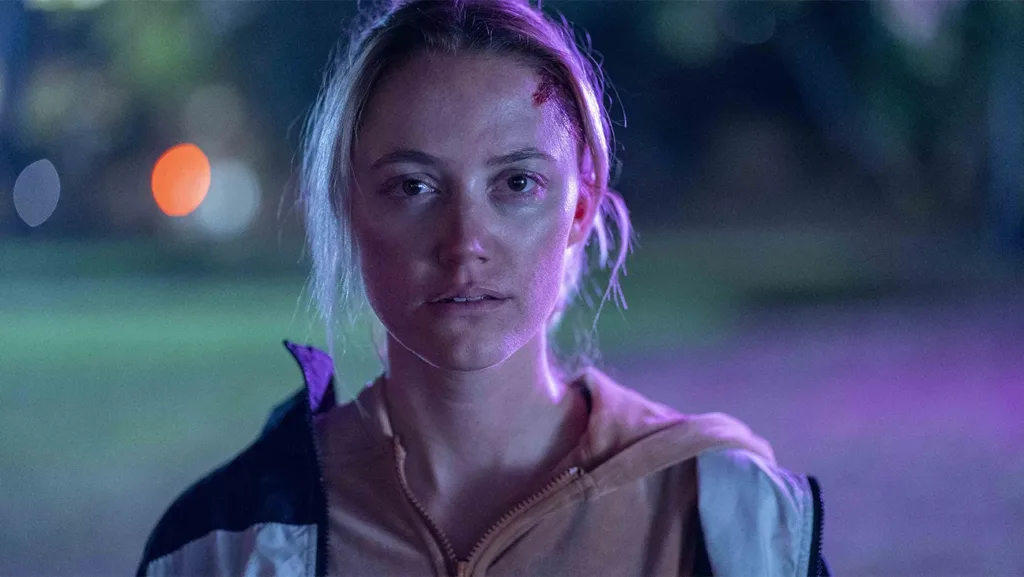Freedom is a fleeting illusion, a brief gasp of air before the inevitable plunge. For Ava, released from a two-year prison sentence, the world she re-enters is not a clean slate but the same cage, just with wider bars. Her return to Ponoka, a town etched into the rugged Alberta landscape, feels less like a homecoming and more like a surrender to gravity.
Here, amidst the dust of the rodeo and the ghosts of past glories, the criminal life she sought to shed clings to her like a second skin. The film wastes no time in re-submerging her, where a violent rupture—the swift, brutal murder of her twin brother—catapults her from the purgatory of parole into the hell of being hunted.
Her existence is immediately compressed into a singular, desperate objective: survival. The presence of her father, Will, a former rodeo champion locked in a world of silence and stern judgment, only deepens the shadows, hinting at wounds far older than any prison sentence.
The Architecture of a Broken Self
A human soul is not a singular entity but a composite of scars, memories, and desperate instincts. Ava is the embodiment of this fractured self, a creature of pure, reactive survival whose hardened exterior protects a core of profound vulnerability.
Maika Monroe gives a performance that is less an act and more a state of being, inhabiting a character who is difficult to romanticize but impossible to look away from. Her fight is not for redemption, but for the next breath. Opposite her is Troy Kotsur’s Will, a figure of monumental quietude.
His silence is not an absence but a presence—a reservoir of disappointment, grief, and a pride that has long since curdled into bitterness. The crisis forces these two damaged souls into a collision, their fractured bond becoming the film’s gravitational center. The past, with its unspoken tragedy surrounding Ava’s mother, erupts into the present.
Their forced reunion becomes an excavation of family trauma under extreme duress. As if to test the limits of her endurance, the universe burdens Ava with her brother’s orphaned infant, a fragile anchor to a future she never conceived of, its innocence a stark counterpoint to the film’s pervasive sense of decay.
A Fever Dream in Neon and Grain
To watch this film is to be submerged in a state of sustained panic. Director Maxime Giroux constructs not an objective narrative, but a subjective experience, trapping us within Ava’s frantic perception of a world closing in.
The screen itself feels abrasive, thanks to Sara Mishara’s stunning cinematography. Shot on grainy film stock, the visuals have a tactile quality, a roughness that mirrors the protagonist’s scraped-raw existence. The camera is an extension of Ava’s own jittery consciousness, unsteady and immediate. Light is not used to illuminate but to disorient; scenes are drenched in lurid hues of red, blue, and green, externalizing the terror and confusion brewing within.
The vast, indifferent beauty of the Alberta landscape serves as a silent witness to this small, human tragedy, its scale rendering the desperate struggle all the more poignant. Philippe Brault’s propulsive synth score acts as the film’s own racing heartbeat, a relentless thrum of anxiety that offers no respite.
The Illusion of Escape
Can one ever truly outrun the person they are? The film wraps itself in the familiar skin of the neo-noir chase thriller, but uses this structure to ask a deeper, more unsettling question. The path is well-trodden: a flawed protagonist, corrupt forces in pursuit, a descent into darkness.
The antagonists—a determined cop, a remote crime boss played by Helen Hunt—function less as fully realized characters and more as instruments of fate, inexorably pushing Ava toward a destination that feels preordained. The narrative is punctuated by dreamlike fragments and shards of memory, moments where the past bleeds into the present, suggesting that time is not a line to be outrun but a circle that always closes.
These flashbacks may disrupt the kinetic momentum, yet they are essential to understanding the psychic prison from which Ava can never escape. The film’s destination is as unflinching as its journey, a sober and impactful final note that rejects easy resolution. It affirms that some stories do not end in victory or defeat, but simply in the exhaustion of all possibilities
“In Cold Light” is a crime thriller that premiered at the Tribeca Festival on June 7, 2025.
Full Credits
Director: Maxime Giroux
Writers: Patrick Whistler
Producers and Executive Producers: Todd Brown, Maxime Cottray, Karen Harnisch, Adrian Love, Yanick Létourneau, Mike MacMillan, Maika Monroe, Michael O’Leary, James Reckseidler, Tim Ringuette
Cast: Maika Monroe, Allan Hawco, Troy Kotsur, Jesse Irving, Helen Hunt, Patrick Sabongui, David Haysom, Geena Meszaros, Warona Setshwaelo, Jessica Abruzzese, Noah Parker, Sampreet Arneja, L. Fernando Becerra Sánchez, Michael Hearn, Jeff Jacobs, Debra Kurtz, Justin Halley Melo, Barry Tuff, Austyn Van de Kamp, David Ward
Director of Photography (Cinematographer): Sara Mishara
Editors: Mathieu Bouchard-Malo
Composer: Philippe Brault
The Review
In Cold Light
"In Cold Light" is a visceral, atmospheric plunge into a familiar heart of darkness. Propelled by raw performances and stunning, grain-textured cinematography, it excels as a sensory experience. While its narrative follows a well-worn path, its unflinching commitment to its bleak, existential tone makes it a haunting journey, even if the destination feels fated from the start. It succeeds more as a mood piece than a novel thriller.
PROS
- Powerful and raw lead performances from Maika Monroe and Troy Kotsur.
- Stunning, atmospheric cinematography that creates a visceral mood.
- Effective, fast-paced direction that immerses the viewer in the character's panic.
CONS
- The neo-noir plot follows a familiar, conventional structure.
- Antagonistic characters feel more like plot devices than fully realized threats.
- The use of flashbacks, while thematically important, can disrupt the narrative momentum.
